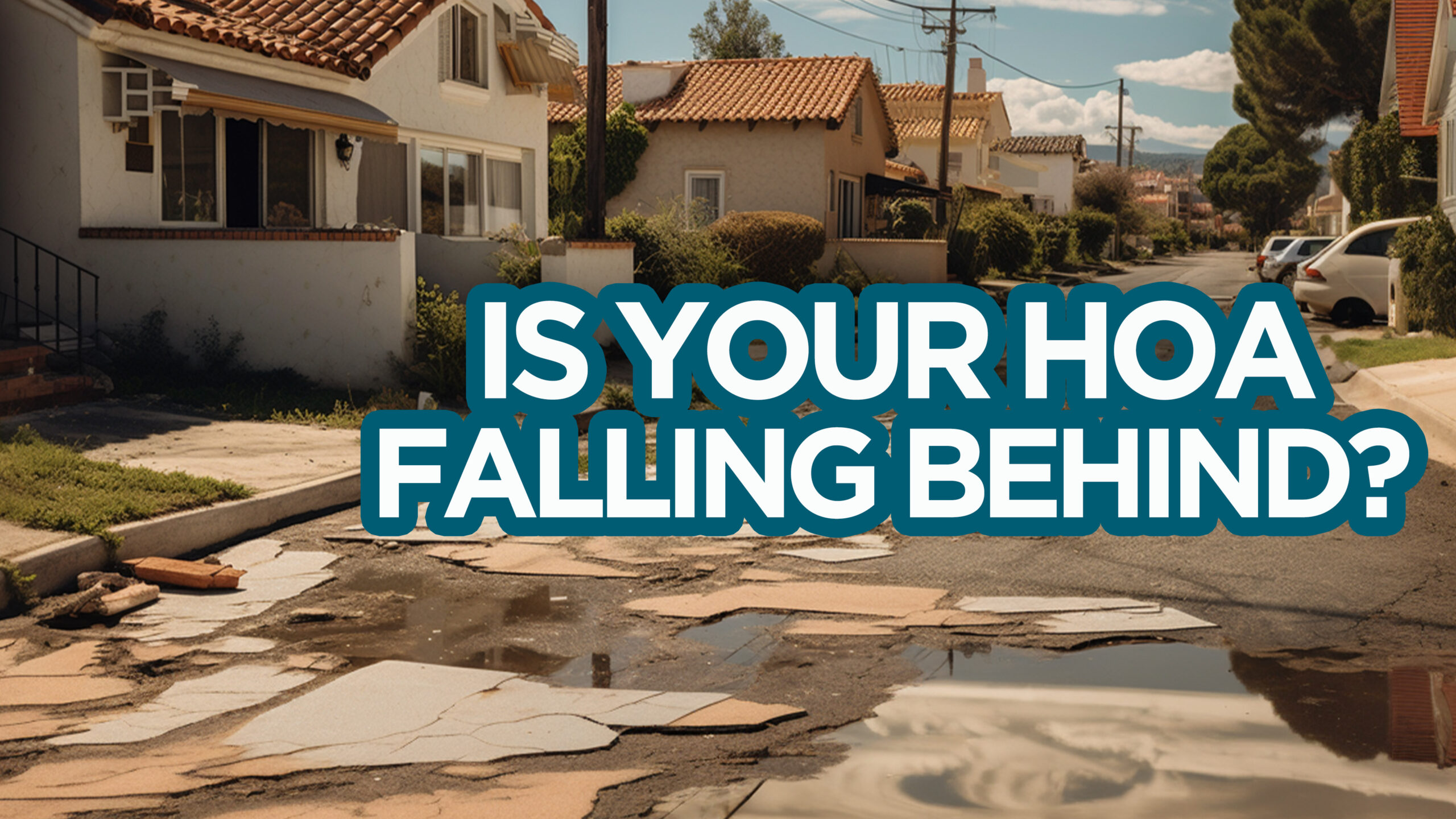As a member of your HOA board, you shoulder significant responsibilities, facing the relentless force of deterioration. Your role is pivotal in preserving and enhancing your community’s value and well-being. Drawing from our “Get On Board” webinar, equip yourself and the board with these tools for effective community management. Explore the duties you (and the homeowners) carry, and learn how to respond to your fellow board members so you can make sure your community is taken care of with reserve funding!
The HOA Board VS Owner’s Responsibilities
As board members, your community’s assets are at stake and your ability to defend against deterioration is crucial. Your role as an HOA board member comes with significant responsibilities and powers that differ from owners. It’s your duty to care for the common areas, ensuring they are maintained, repaired, renovated, restored, and replaced when necessary. As outlined in your governing documents, be it in your CC&Rs or bylaws, this forms the foundation of your role and authority to act in the best interests of the entire community. There are no limitations or “ifs.” You have the power to take care of the common areas for the benefit of all current and future owners.
The Business Judgment Rule
With the weight of your responsibilities, it’s more than recommended to follow the business judgment rule: the duty of care, the duty of loyalty, and the duty of inquiry. By demonstrating care in your decision-making, loyalty to the association, and a willingness to seek guidance when needed, you ensure that the law is on your side for every decision you make.

Being a Corporate Officer
Many board members did not initially join the board with the intention of becoming corporate officers. Nevertheless, you now bear the responsibility of overseeing a multimillion-dollar real estate entity. This is challenging, especially when dealing with untrained volunteer board members. But nothing is worse than leaving your HOA unprepared and paying the price later.
When the HOA Board Doesn’t Have Reserve Funding
Ignoring or underfunding reserves can have dire consequences, as demonstrated by the tragic events of Champlain Tower South in 2021. In that incident, 98 lives were lost due to the neglect of maintenance at an oceanfront property. It serves as a stark reminder of the critical importance of adequately funding and managing HOA reserves to protect your community. Remember that you are the first line of defense, and your actions directly impact the well-being of everyone in your community, including the HOA board.
To fortify your defenses, you must understand your two essential tools: your budget and your message. These tools, when used effectively, can align HOA board members and homeowners behind a successful reserve funding strategy that safeguards your community, rather than drowning it in expensive risks.
Here are the best responses to common concerns that often hinder proper reserve funding:
“We can’t afford reserve funding.”

One popular concern is the claim that reserve funding is financially unachievable. In response, emphasize that the cost of deterioration does not disappear when ignored. The association will eventually have to pay for repairs either through ongoing budgets or special assessments. Either way, you are paying a price – it’s a matter of choosing which. Reserve funding doesn’t increase costs; it simply ensures that expenses are spread out more evenly. Additionally, highlight the long-term benefits, such as increased property values and reduced costs of deferred maintenance, which outweighs the initial investment.
“Reserve funding is too expensive.”

Some individuals may perceive reserve funding as a luxury beyond their means. Counter this misconception by showcasing the tangible benefits of proper maintenance. Share examples of past investments that led to increased property values and homeowner satisfaction. Emphasize that reserve funding is a smart financial choice that protects the community’s assets and prevents more extensive and expensive repairs in the future.
“Why should I contribute to reserve funding if I won’t be living here when repairs or replacements happen?”

Occasionally, board members argue against contributing to reserves, especially if they plan to move in the near future. In response, convey the importance of fairness and shared responsibility. Explain that reserve funding isn’t about paying for the distant future; it’s about offsetting the ongoing deterioration of common areas while residents live in the community right now. Everyone pays their fair share for what they are using during their occupancy.
“But it’s not required in my state.”

When confronted with the claim that reserve funding isn’t mandatory in your state, remind board members and homeowners that state law doesn’t halt the natural deterioration of common areas. Stress the responsibility of the board to ensure proper maintenance and protect property values. Encourage a proactive approach rather than relying solely on legal mandates. Don’t just follow the law, but think: what do I want from my association? Do I want my property values maximized? What do I need to do to move my association forward? Along with that, take a critical walk around and ask yourself, do you like what you see? And are we prepared for what’s ahead?
“Homeowners won’t approve it.”

Where homeowners have the final say over the budget, some board members might express concern about obtaining homeowner approval for reserve funding. To address this, use your power where you can and incrementally increase assessments however possible. Meanwhile, improve your messaging and communicate the necessity of these contributions. Consistently educate homeowners about inflation, the ongoing deterioration of common areas, and the tangible benefits of reserve funding. Show them that a little bit each year will prevent larger special assessments down the road.
“Our HOA board doesn’t know what to do.”

For boards struggling with the complexity of reserve funding, remember the duty of inquiry within the business judgment rule. Find out what you should do, ask questions, and get professional help when needed. Reserve funding is not guesswork; it’s based on solid information about your association’s components and their expected lifespans. Continuously update your reserve study and adapt to changing circumstances, like inflation or unexpected events, to ensure everyone is adequately prepared. If you want help from highly experienced reserve study professionals, don’t hesitate to get us on your team.

While it may feel like a lot of work, the rewards of maintaining your HOA property through properly funded reserves are both life-changing and measurable:
1. HOA Board Peace of Mind
One of the intangible rewards of properly funded HOA reserves is the peace of mind it brings. Knowing that your family and neighbors are safe and that your property is well taken care of can relieve a significant burden. With reserves in place, you can address maintenance and repair needs promptly, ensuring the safety and enjoyment of your community.
2. Stop Special Assessments
Properly funded reserves eliminate the need for special assessments. When you have the necessary funds readily available, projects can be completed without causing financial strain on homeowners. This leads to smoother board meetings, quicker project execution, and a happier community overall.
3. Reduce HOA Liability Exposure
While not legal advice, it’s essential to understand that maintaining your property responsibly can lower your liability exposure. Following governing documents and adhering to the business judgment rule significantly reduces the risk of legal challenges. When you make prudent decisions as a board member, you can sleep peacefully knowing you’ve minimized potential disputes and liabilities.
4. Raise HOA Property Values
Perhaps one of the most compelling rewards of properly funding HOA reserves is the substantial increase in property values. Curb appeal plays a vital role in determining property values, and well-maintained common areas can substantially enhance the attractiveness of your community. A study conducted in 2017 found that well-funded associations experienced a 12.6% higher home value. This means that your modest reserve contributions can translate into thousands of dollars in increased home values.
5. HOA Community Spirit
Properly funding reserves fosters a sense of community spirit and pride of ownership. Communities that invest in maintaining their appearance tend to experience less friction and tension during HOA board meetings. With fewer deferred maintenance issues and the ability to complete projects promptly, homeowners are more likely to take pride in their community and share their great experience with others.
By sufficiently funding HOA reserves, you can enjoy a myriad of rewards, both tangible and intangible. From financial peace of mind to higher home values, your efforts directly impact the quality of life for all community members. Remember that you have been entrusted with the tools and responsibilities to safeguard your association’s assets and maximize property values. By effectively communicating the importance of reserve funding to homeowners, you can ensure that your community thrives, property values soar, and everyone enjoys a well-maintained and financially stable HOA.
